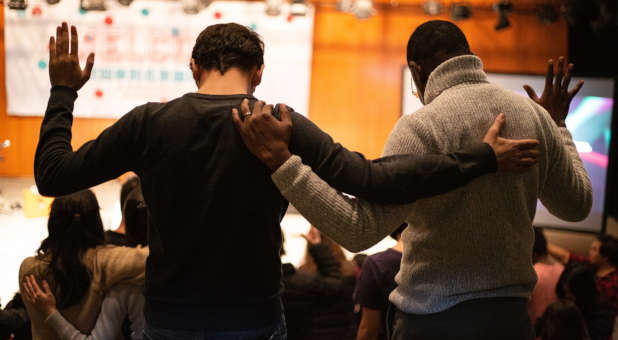
In 1960, 1 in 1,000 marriages was between a white person and a Black person. Interracial marriage was still illegal in 16 states. Today, one marriage in six marriages is between ethnicities. By the time my young children get married, 1 in 3 marriages will be between ethnicities. This issue of diversity is not only a demographic reality; it's a gospel reality. What humanity segregates, God brings back together. Racial segregation is a vile lie from the pit of hell.
More importantly, our churches should reflect this demographic change. Indeed, the church should lead with this demographic change. Public schools will become ethnically diverse simply because of who moves into the neighborhood. Why shouldn't our churches also make this same shift? The tribes and nations are moving in together. The church should move out to them. Ethnically diverse neighborhoods are not Nineveh. They are a taste of heaven.
While specific churches are leading the way with this issue, a movement of tens of thousands of churches does not exist. Perhaps we're at the beginning stages of such a movement. I certainly hope so. For this movement to pick up steam, however, a few things will likely need to occur. Below are four ways more churches might transition to become multiethnic:
— A diverse staff. In most cases, churches will not become more diverse until the staff is more diverse. This diversity is especially important with the visible staff positions, like senior pastors and worship pastors.
— Heterogeneous mergers. Church mergers are becoming more prevalent. These mergers come in many shapes and sizes. However, we need to see more mergers between two (or three) congregations with different ethnicities. Most church mergers are homogenous—two churches with a similar make up of people. Stories of heterogeneous mergers are far too rare.
— Geographic focus. The last 25 years have brought about a renewed focus in church planting, as well as the proliferation of multisite churches. Planting sites and churches in diverse areas of the country is a huge need. These sites and new churches can start as multiethnic.
— Preschool and children's ministry. Even if a church might resist a merger, or even resist the idea of becoming multiethnic, the children of the church will never know the difference. If a church has a diverse preschool and children's ministry, then within a generation, it's more likely to be a multiethnic church.
These four paths of diversity are more general in nature. But there is a personal level. What can you do as an individual leader to help your church move towards cultural and racial diversity? Every church leader can do something. In fact, if pastors started doing these four items, then many strides could be made towards cultural and racial diversity in our churches:
— Individual relationships. You should intentionally develop a relationship with another church leader in your community who is not of your ethnic background. When you build bridges to other leaders in this way, you also tear down walls in congregations.
— Organizational relationships. You should get involved in an organization or event that is not for your ethnicity. Traveling to a different international context broadens your worldview. In the same way, getting involved with people of different ethnicities broadens your understanding of cultural issues in your own backyard.
— Read more diversely. You should read books, blogs and publications that have a different ethnic audience than your own. Diving into the ideas of others strengthens your appreciation for their struggles and victories.
— Listen to people of color. Perhaps the easiest way to grow as a multiethnic leader is to listen to ethnic leaders. Simply pay attention to their social media feeds. Go to a meeting with them and observe. Attend their church and worship as they do. I bet you will learn something.
The move toward racial and cultural diversity in our churches probably doesn't feel like a pressing need. The tyranny of the urgent seems to get our attention on a daily basis. Growing ethnically comes more as a gnawing reminder that there is more to do. But this growth is important.
In fact, the health of the church in 20 years depends upon our steps in this direction today. ![]()
For the original article, visit churchanswers.com.
As president of Church Answers, Sam Rainer wears many hats. From podcast co-host to full-time pastor at West Bradenton Baptist Church, Sam's heart for ministry and revitalization are evident in all he does.
Get Spirit-filled content delivered right to your inbox! Click here to subscribe to our newsletter.
Dr. Mark Rutland's
National Institute of Christian Leadership (NICL)
The NICL is one of the top leadership training programs in the U.S. taught by Dr. Mark Rutland. If you're the type of leader that likes to have total control over every aspect of your ministry and your future success, the NICL is right for you!
FREE NICL MINI-COURSE - Enroll for 3-hours of training from Dr. Rutland's full leadership course. Experience the NICL and decide if this training is right for you and your team.
Do you feel stuck? Do you feel like you’re not growing? Do you need help from an expert in leadership? There is no other leadership training like the NICL. Gain the leadership skills and confidence you need to lead your church, business or ministry. Get ready to accomplish all of your God-given dreams. CLICK HERE for NICL training dates and details.The NICL Online is an option for any leader with time or schedule constraints. It's also for leaders who want to expedite their training to receive advanced standing for Master Level credit hours. Work through Dr. Rutland's full training from the comfort of your home or ministry at your pace. Learn more about NICL Online. Learn more about NICL Online.


